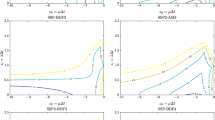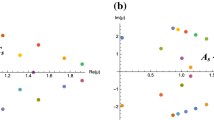Abstract
Many physical phenomena contain different scales. These phenomena can be modeled using partial differential equations (PDEs). Often, these PDEs can be split additively in a fast and a slow part. We extend the multirate infinitesimal steps methods (MIS) to multirate finite step methods (MFS). Both methods resolve the fast scale with an auxiliary differential equation with a fixed slow part. The order conditions of the MIS are derived under the assumption of an exactly resolved fast scale. In contrast, the MFS methods take numerical error of the (numerical) fast , solution into account. We introduce the MFS methods and derive their order conditions for different fast scale integrators. Finally, we give some numerical experiments and compare their stability areas.




Similar content being viewed by others
References
Bremicker-Trübelhorn, S., Ortleb, S.: On multirate GARK schemes with adaptive micro step sizes for fluid–structure interaction: Order conditions and preservation of the geometric conservation law. Aerospace 4(1), 8 (2017). https://doi.org/10.3390/aerospace4010008
Kennedy Christopher, A, Carpenter Mark, H.: Additive Runge-Kutta schemes for convection-diffusion-reaction equations. NASA (2001)
Durran, D.R.: Numerical methods for wave equations in geophysical fluid dynamics. Springer, New York (1999). ISBN 0387983767
Gear, C.W., Wells, D.R.: Multirate linear multistep methods. BIT Numer. Math. 24(4), 484–502 (1984). https://doi.org/10.1007/BF01934907
Günther, M., Sandu, A.: Multirate generalized additive Runge Kutta methods. Numer. Math. 133(3), 497–524 (2016)
Knoth, O., Wensch, J.: Generalized split-explicit Runge–Kutta methods for the compressible euler equations. Mon. Weather. Rev. 142(5), 2067–2081 (2014). https://doi.org/10.1175/MWR-D-13-00068.1
LeVeque, R.J.: Fvm for hyperbolic problems (2002)
Sandu, A., Günther, M.: A generalized-structure approach to additive Runge–Kutta methods. SIAM J. Numer. Anal. 53(1), 17–42 (2015)
Savcenco, V., Hundsdorfer, W., Verwer, J.G.: A multirate time stepping strategy for stiff ordinary differential equations. BIT Numer. Math. 47, 137–155 (2007). ISSN 0006-3835
Van Loan, C.F.: The ubiquitous Kronecker product. J. Comput. Appl. Math. 123(1), 85–100 (2000)
Wächter, A., Biegler, L.T.: On the implementation of an interior-point filter line-search algorithm for large-scale nonlinear programming. Math. Program. 106(1), 25–57 (2006). https://doi.org/10.1007/s10107-004-0559-y. ISSN 1436-4646
Hairer, E., Nørsett, S.P., Wanner, G.: Solving Ordinary Differential Equations. 1, Nonstiff Problems. Springer, Berlin (2009). [u.a.] :, 2., rev. ed., 1. softcover printing edition. ISBN 9783642051630
Wensch, J., Knoth, O., Galant, A.: Multirate infinitesimal step methods for atmospheric flow simulation. BIT Numer. Math. 49(2), 449–473 (2009)
Wicker, L.J., Skamarock, W.C.: Time-splitting methods for elastic models using forward time schemes. Mon. Weather. Rev. 130(8), 2088–2097 (2002)
Funding
This work was funded by the German Research Foundation under the grant CRC/96.
Author information
Authors and Affiliations
Corresponding author
Additional information
Publisher’s note
Springer Nature remains neutral with regard to jurisdictional claims in published maps and institutional affiliations.
Rights and permissions
About this article
Cite this article
Naumann, A., Wensch, J. Multirate finite step methods. Numer Algor 81, 1547–1571 (2019). https://doi.org/10.1007/s11075-019-00763-1
Received:
Accepted:
Published:
Issue Date:
DOI: https://doi.org/10.1007/s11075-019-00763-1




